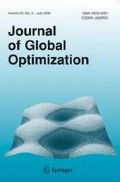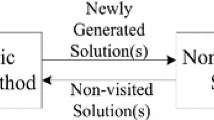Abstract
We examine the concept of storing all evaluated chromosomes and directly reuse them in Genetic Algorithms (GAs). This is achieved by a fully encapsulated operator, called Registrar, which is effortlessly placed between the GA and the objective function. The Registrar does not approximate the objective function. Instead, it replaces the chromosomes requested by the GA with similar ones taken from the registry, bypassing the function evaluation. Unlike other methods that use external memory to increase genetic diversity, our simple implementation encourages revisits in order to avoid evaluations in an aggressive manner. Significant increase in performance is observed which is present even at the early stages of evolution, in accordance with the Birthday Problem of probability theory. Implementation with Standard GA shows great promise, while the encapsulation of the code facilitates implementation with other Evolutionary Algorithms.
Similar content being viewed by others
References
Eiben A.E., Smith J.E.: Introduction to Evolutionary Computing. Springer, New York (2003)
Floudas C.A., Akrotirianakis I.G., Caratzoulas S., Meyer C.A., Kallrath J.: Global optimization in the 21st century: advances and challenges. Comput. Chem. Eng. 29(6), 1185–1202 (2005)
Floudas C.A., Gounaris C.E.: A review of recent advances in global optimization. J. Glob. Optim. 45, 3–38 (2009)
Pardalos P.M., Resende M.: Handbook of Applied Optimization. Oxford University Press, Oxford (2002)
Floudas, C.A., Pardalos, P.M. (eds): Encyclopedia of Optimization, 2nd edn. Springer, New York (2009)
Holland J.H.: Adaptation in Natural and Artificial Systems. University of Michigan Press, Ann Arbor, MI (1975)
Shan S., Wang G.G.: Survey of modeling and optimization strategies to solve high-dimensional design problems with computationally-expensive black-box functions. Struct. Multidisc. Optim. 41(2), 219–241 (2010)
Jin Y.: A comprehensive survey of fitness approximation in evolutionary computation. Soft Comput. 9(1), 3–12 (2005)
Barthelemy J.-F.M., Haftka R.T.: Approximation concepts for optimum structural design—a review. Struct. Optim. 5, 129–144 (1993)
Papalambros P.Y.: Optimal design of mechanical engineering systems. ASME J. Mech. Des. 117, 55–62 (1995)
Simpson T.W., Peplinski J.D., Koch P.N., Allen J.K.: Metamodels for computer-based engineering design: survey and recommendations. Eng. Comput. 17(2), 129–150 (2001)
Smith, R.E., Dike, B.A., Stegmann, S.A.: Fitness inheritance in genetic algorithms. In: Proceedings of the ACM Symposium on Applied Computing, pp. 345–350 (1995)
Xu R., Wunsch D.C. II: Survey of clustering algorithms. IEEE Trans. Neural Netw. 16(3), 645–678 (2005)
Hart, W.E.: Adaptive Global Optimization with Local Search. Ph.D. dissertation, University of California at San Diego, CA (1994)
Grosan C., Abraham A.: Hybrid evolutionary algorithms: methodologies, architectures, and reviews. Stud. Comp. Intell. (SCI) 75, 1–17 (2007)
Charalampakis A.E., Koumousis V.K.: Identification of Bouc-Wen hysteretic systems by a hybrid evolutionary algorithm. J. Sound Vib. 314(3–5), 571–585 (2008)
Vasconcelos J.A., Ramírez J.A., Takahashi R.H.C., Saldanha R.R.: Improvements in genetic algorithms. IEEE Trans. Magn. 37(5), 3414–3417 (2001)
Koumousis V.K., Katsaras C.P.: A saw-tooth genetic algorithm combining the effects of variable population size and reinitialization to enhance performance. IEEE Trans. Evol. Comput. 10(1), 19–28 (2006)
Mauldin, M.L.: Maintaining diversity in genetic search. In: Proceedings of the National Conference on Artificial Intelligence, pp. 247–250 (1984)
Ronald S.: Preventing diversity loss in a routing genetic algorithm with hash tagging. In: Stonier, R., Yu, X.H. (eds) Complex Systems: Mechanism of Adaption, pp. 133–140. IOS Press, Amsterdam (1994)
Ronald, S.: Duplicate genotypes in a genetic algorithm. In: Proceedings of the IEEE International Conference on Evolutionary Computation, pp. 793–798 (1998)
Povinelli, R.J., Feng, X.: Improving genetic algorithms performance by hashing fitness values. In: Proceedings of the Artificial Neural Networks in Engineering, pp. 399–404 (1999)
Kratica J.: Improving performances of the genetic algorithm by caching. Comput. Artif. Intell. 18(3), 271–283 (1999)
Yuen S.Y., Chow C.K.: A genetic algorithm that adaptively mutates and never revisits. IEEE Trans. Evol. Comput. 13(2), 454–472 (2009)
Altus S.S., Kroo I.M., Gage P.J.: A genetic algorithm for scheduling and decomposition of multidisciplinary design problems. ASME J. Mech. Des. 118(4), 486–489 (1996)
Jeong S., Murayama M., Yamamoto K.: Efficient optimization design method using Kriging model. J. Aircr. 42, 413–420 (2005)
Ding, C., He, X., Zha, H., Simon, H.D.: Adaptive dimension reduction for clustering high dimensional data. In: Proceedings of the ICDM, pp. 147–154 (2002)
Wang G.G., Dong Z., Aitchison P.: Adaptive response surface method—a global optimization scheme for computation-intensive design problems. J. Eng. Optim. 33(6), 707–733 (2001)
Kleijnen J.P.C: Statistical Tools for Simulation Practitioners. Marcel Dekker, New York (1987)
Gutmann H.-M.: A radial basis function method for global optimization. J. Global Optim. 19(3), 201–227 (2001)
Regis R.G., Shoemaker C.A.: Constrained global optimization of expensive black box functions using radial basis functions. J. Global Optim. 31(1), 153–171 (2005)
Knowles J.: ParEGO: a hybrid algorithm with on-line landscape approximation for expensive multiobjective optimization problems. IEEE Trans. Evol. Comput. 10(1), 50–66 (2006)
Sastry, K., Goldberg, D.E., Pelikan, M.: Don’t Evaluate, Inherit. Technical report 2001013, IlliGAL, University of Illinois at Urbana-Champaign (2001)
Chen, J.-H., Goldberg, D.E., Ho, S.-Y., Sastry, K.: Fitness Inheritance in Multi-Objective Optimization. Technical report 2002017, IlliGAL, University of Illinois at Urbana-Champaign (2002)
Salami M., Hendtlass T.: A fast evaluation strategy for evolutionary algorithms. Appl. Soft Comput. 2(3), 156–173 (2003)
Kim, H.-S., Cho, S.-B: An efficient genetic algorithm with less fitness evaluation by clustering. In: Proceedings of the CEC, pp. 887–894 (2001)
Martínez-Estudillo A.C., Hervás-Martínez C., Martínez-Estudillo F.J., García-Pedrajas N.: Hybridization of evolutionary algorithms and local search by means of a clustering method. IEEE Trans. Syst. Man Cybern. B Cybern. 36(3), 534–545 (2006)
Rosin C.D., Belew R.K.: New methods for competitive coevolution. Evol. Comput. 5(1), 1–29 (1997)
Buriol L.S., Hirsch M.J., Pardalos P.M., Querido T., Resende M.G.C., Ritt M.: A biased random-key genetic algorithm for road congestion minimization. Optim. Lett. 4(4), 619–633 (2010)
Eggermont, J., Lenaerts, T.: Non-stationary Function Optimization Using Evolutionary Algorithms with a Case-based Memory. Technical report 2001–2011, Leiden University Advanced Computer Science (LIACS) (2001)
Acan, A., Tekol, Y.: Chromosome reuse in Genetic Algorithms. In: Proceedings of the GECCO, pp. 695–705 (2003)
Prime, B., Hendtlass, T.: Mechanisms for evolutionary reincarnation. In: Proceedings of the ACAL, pp. 245–256 (2007)
McKinney E.H.: Generalized birthday problem. Am. Math. Mon. 73(4), 385–387 (1966)
Carroll, D.L.: FORTRAN Genetic Algorithm (GA) Driver. http://www.cuaerospace.com/carroll/ga.html (2010). Accessed 7/1/2011
Suganthan, P.N., Hansen, N., Liang, J.J., Deb, K., Chen, Y.-P., Auger, A., Tiwari, S.: Problem Definitions and Evaluation Criteria for the CEC 2005 Special Session on Real-parameter Optimization. Technical report Nanyang Technological University, Singapore (2005)
Press W.H., Teukolsky S.A., Vetterling W.T., Flannery B.P.: Numerical Recipes in C. Cambridge University Press, Cambridge (1999)
Kennedy, J., Eberhart, R.C.: Particle swarm optimization. In: Proceedings of the IEEE International Conference on Neural Networks, pp. 1942–1948 (1995)
Charalampakis, A.E.: Introduction of Full Memory in particle Swarm Optimization Algorithms (in preparation)
Goldberg, D.E.: Sizing populations for serial and parallel genetic algorithms. In: Proceedings of the ICGA, pp. 70–79 (1989)
Krishnakumar, K.: Micro-genetic algorithms for stationary and nonstationary function optimization. In: Proceedings of the SPIE Intelligent Control and Adaptive Systems, pp. 1942–1948 (1989)
Author information
Authors and Affiliations
Corresponding author
Rights and permissions
About this article
Cite this article
Charalampakis, A.E. Registrar: a complete-memory operator to enhance performance of genetic algorithms. J Glob Optim 54, 449–483 (2012). https://doi.org/10.1007/s10898-011-9770-6
Received:
Accepted:
Published:
Issue Date:
DOI: https://doi.org/10.1007/s10898-011-9770-6




